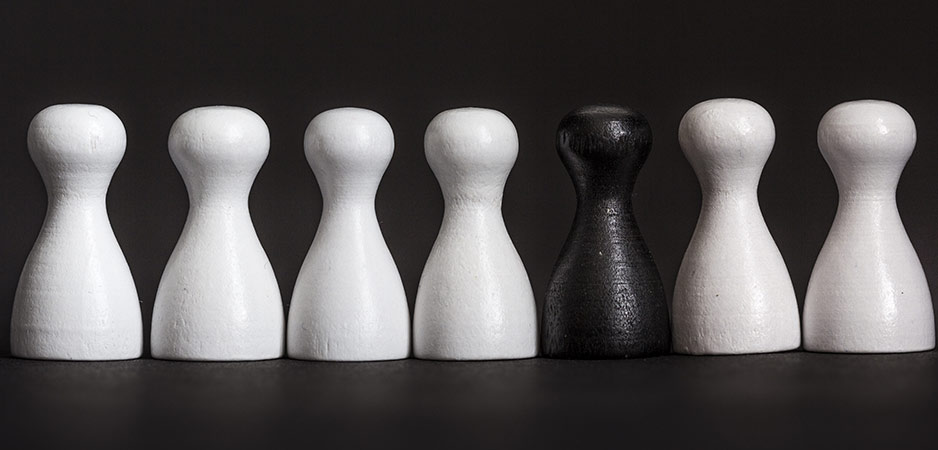Last night, the caregiver who comes to help my 98-year-old mother take a shower and get ready for bed arrived looking a little shocked. She’d just been angrily rejected by another patient, an elderly man who had complained, “You’re not even white.” He was white; she is African Caribbean and lives in Birmingham — one of the UK’s most culturally diverse cities. She told us how he complained he couldn’t understand her. She speaks with an melodic patois lilt — in fact, we’d recently laughed at how, in her nine years in the West Midlands, she hadn’t picked up the Brummie twang (fortunately).
She imitated the noise he made when he was trying to mimic her. She took it in good humor and left, as the patient instructed. The incident reminded me of my own naiveté. I’m not so gullible that I believe racism has disappeared. But I hadn’t anticipated an incident like this would ever occur, at least not in a place like Birmingham, which has experienced a most troublesome passage from the post-World War II period to the present.
An Idea of Beauty
A couple of weeks ago, in Atlanta, Georgia, Zozibini Tunzi was crowned Miss Universe and made her own piece of history. Her victory marked the first time black women have simultaneously held the titles of the world’s four major beauty pageants. Set aside your reservations about these pageants and whether they degrade or objectify women: Think instead about how the occasion signaled recognition that black women are beautiful.
For decades, perhaps centuries, black women have straightened their hair and bleached their facial skin in an effort to conform to universally accepted standards of beauty. The standards were set and have been perpetuated, of course, by whites. “There’s this idea of what beautiful is,” Gabriela Taveras has observed. “And in the past that ideal was white women.” Taveras was the first black woman to win the title of Miss Massachusetts. She is a thoughtful commentator on these affairs and realizes that winning a beauty contest is hardly going to end racism. In fact, she’s spoken out about the online abuse she’s received. The word “monkey” has been used.
In recent days, Italy’s Serie A football league has been criticized almost unanimously for using images of apes as part of its campaign against the racism that regularly haunts the sport, not only in Italy but in many other parts of the world, especially Eastern Europe. The images were the work of artist Simone Fugazzotto and were designed to “spread the values of integration, multiculturalism and brotherhood.” The aims are commendable, though the methods were misunderstood.
The message — presumably that humans, apes and monkeys are all primates and descend from the same family of mammals — was widely condemned and, although no one explained why they thought the campaign was wrongheaded, I assume they thought the associations of monkeys and people of African origin or descent are still so strong that any visual reminder of this is bound to promote rather than subdue racism. I think they’re wrong, but I admit Fugazotto’s subtext is probably too sophisticated for its own good.
Collectively, the three incidents force me to recognize not only that racism remains a force in modern society, but that no one any longer knows why. I’ve spent much of my professional life researching, writing and talking about racism, in several different manifestations. I’ve written textbooks, led projects like The Logic of Racism and offered cultural biographies of figures such as Mike Tyson who, in many ways, embodied the paradox of being a black man who was simultaneously revered and detested.
My experiences taught me that racism typically emerges in situations when there is competition over limited resources — not just money, but jobs, housing and less tangible properties like prestige, status and respect.
A Label
“Race” is a label rather than a biological reality, stuck on conveniently to mark some groups out and justify their exploitation or, sometimes, oppression. This wasn’t a comprehensive theory, but I’ve come to believe there is no one-size-fits-all explanation of racism that holds water throughout history and in every society. Today, I think we are really struggling. The competition and the rivalries it propagates are still around, but only in a kind of vestigial form.
Practically everywhere in the world members of groups that were historically regarded as “races” have risen to prominence in politics, commerce, sports and entertainment. The mutually destructive conflict that pockmarked all of America’s history and which has, in recent decades, migrated almost everywhere, has certainly weakened, but a glance at any day’s news will serve to remind us that it endures.
The more blatant demonstrations of organized racism have gone. So have the intelligence-insulting stereotypes that survived so many falsifications yet managed to linger in the white imagination. The magnifying role of the media has, in recent years, been accepted and adjusted, so we now see cultural miscellany where it never even existed — I’m thinking of how every historical drama, whether set in Victorian, Regency or Gothic England, features black and Asian characters.
I’d even venture we have less liberal hypocrisy disguising a kind of crypto-racism nowadays. The era of post-truth makes it difficult to divine racism, but it is still out there, even, or perhaps especially, in those parts of society where we least expect it.
The views expressed in this article are the author’s own and do not necessarily reflect Fair Observer’s editorial policy.
Support Fair Observer
We rely on your support for our independence, diversity and quality.
For more than 10 years, Fair Observer has been free, fair and independent. No billionaire owns us, no advertisers control us. We are a reader-supported nonprofit. Unlike many other publications, we keep our content free for readers regardless of where they live or whether they can afford to pay. We have no paywalls and no ads.
In the post-truth era of fake news, echo chambers and filter bubbles, we publish a plurality of perspectives from around the world. Anyone can publish with us, but everyone goes through a rigorous editorial process. So, you get fact-checked, well-reasoned content instead of noise.
We publish 2,500+ voices from 90+ countries. We also conduct education and training programs
on subjects ranging from digital media and journalism to writing and critical thinking. This
doesn’t come cheap. Servers, editors, trainers and web developers cost
money.
Please consider supporting us on a regular basis as a recurring donor or a
sustaining member.
Will you support FO’s journalism?
We rely on your support for our independence, diversity and quality.





